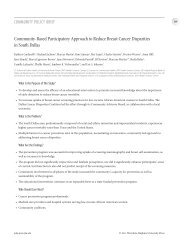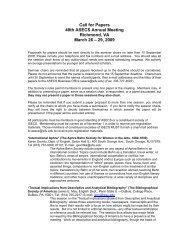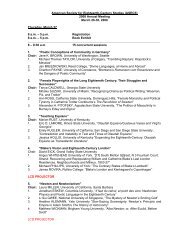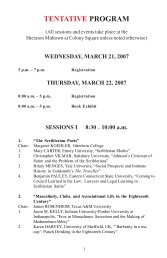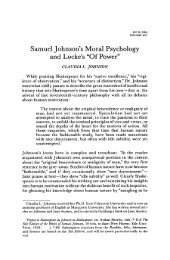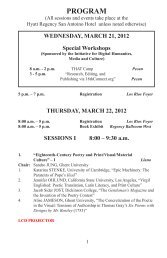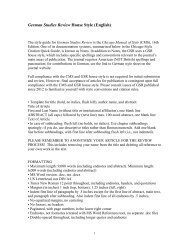Ethical Issuesin Rural Health Careedited by Craig M. Klugman and Pamela M. DalinisThis volume initiates a much-needed conversation aboutthe ethical and policy concerns facing health care providersin the rural United States. Although 21 percent of thepopulation lives in rural areas, only 11 percent of physicianspractice there. What challenges do health care workers facein remote locations? What are the differences between ruraland urban health care practices? What particular ethical issuesarise in treating residents of small communities? Craig M.Klugman and Pamela M. Dalinis gather philosophers, lawyers,physicians, nurses, and researchers to discuss these andother questions, offering a multidisciplinary overview ofrural health care in the United States.Rural practitioners often practice within small, tight-knitcommunities, socializing with their patients outside the examinationroom. <strong>The</strong> residents are more likely to have limitedfinances and lack health insurance. Physicians may haveinsufficient resources to treat their patients, who often haveto travel great distances just to see a doctor.<strong>The</strong> first part of the book analyzes the differences betweenrural and urban cultures and discusses the difficulties intreating patients in rural settings. <strong>The</strong> second part featuresthe personal narratives of rural health care providers, whoshare their experiences and insights. <strong>The</strong> last part introducesunique ethical challenges facing rural health care providersand proposes innovative solutions to those problems.This volume is a useful resource for bioethicists, membersof rural bioethics committees and networks, policy makers,teachers of health care providers, and rural practitionersthemselves.“This volume elucidates a wide range of ethical issues and the authorsprovide helpful strategies for practice and policy.”—Ruth B. Purtilo, Massachusetts General Hospital Instituteof Health ProfessionsCraig M. KlugmaN is an associate professor of bioethics at the<strong>University</strong> of Nevada, Reno. Pamela M. Dalinis is a bioethicsconsultant and Director of Education at Midwest Palliativeand Hospice CareCenter.Philosophical Issuesin PsychiatryExplanation, Phenomenology, and Nosologyedited by Kenneth S. Kendler, M.D.,and Josef Parnas, M.D., Dr.Med.Sci.This multidisciplinary collection explores three key conceptsunderpinning psychiatry—explanation, phenomenology,and nosology—and their continuing relevance in an age ofneuroimaging and genetic analysis.An introduction by Kenneth S. Kendler lays out the philosophicalgrounding of psychiatric practice. <strong>The</strong> first sectionaddresses the concept of explanation, from the difficultiesin describing complex behavior to the categorization ofpsychological and biological causality. In the second section,contributors discuss experience, including the complex andvexing issue of how self-agency and free will affect mentalhealth. <strong>The</strong> third and final section examines the organizationaldifficulties in psychiatric nosology and the instabilityof the existing diagnostic system. Each chapter has both anintroduction by the editors and a concluding comment byanother of the book’s contributors.“Few books on psychiatry explore with seriousness and clarity the difficultproblems of explanation, scientific description, and causality.This one does. <strong>The</strong> introductions are like having an articulate and patientprofessor at your shoulder. <strong>The</strong> material is discussed by first-ratepeople in their fields, and the commentaries prevent the discussionfrom becoming static or predictable. I hope this sophisticated bookwill be read widely and considered carefully.”—John Z. Sadler, M.D., editor of Descriptions andPrescriptions: Values, Mental Disorders, and the DSMsKenneth S. Kendler, M.D., is the Rachel Brown Banks DistinguishedProfessor of Psychiatry at the Medical Collegeof Virginia, where he is also a professor of human geneticsand the director of the Virginia Institute for Psychiatric andBehavioral Genetics. He is the author of, most recently, Genes,Environment, and Psychopathology. Josef Parnas, M.D., Dr.Med.Sci., is a professor of psychiatry and the consultant medicaldirector for the Department of Psychiatry at Copenhagen<strong>University</strong>. He is also the codirector of the National DanishResearch Foundation’s Center for Subjectivity Research.December 288 pages 6 x 9 2 illustrations978-0-8018-9045-1 0-8018-9045-4 $50.00(s) / £27.00 hcMedical EthicsNovember 416 pages 6 x 9 5 halftones, 10 line drawings978-0-8018-8983-7 0-8018-8983-9 $60.00(s) / £32.00 hcPsychiatryTHE JOHNS HOPKINS UNIVERSITY PRESS www.press.jhu.edu 50
New Choices, New FamiliesHow Lesbians Decide about MotherhoodNancy J. MezeyHow do lesbians decide tobecome mothers or remainchildfree? Why do new familiesform at particular historicalmoments? <strong>The</strong>se questionsare at the heart of Nancy J.Mezey’s New Choices, NewFamilies.Researchers, politicians, andsociety at large continue todebate the changing Americanfamily, especially nontraditionalfamilies that emerge fromdivorce, remarriage, grandparents-as-parents,and adoption.This ongoing discussion also engages the controversysurrounding the parental rights of same-sex couples andtheir families.New Choices, New Families enters into this conversation.Mezey asks why lesbians are forming families at this particularhistorical moment and wonders how race, class, sexualidentity, and family history factor into the decision-makingprocess. Drawing heavily from personal interviews, Mezey’sgroundbreaking analysis gives voice to groups long underrepresentedin similar studies—black, Latina, working class,and childfree lesbians. Some chapters examine how childhoodexperiences contribute to the desire to become amother, while others consider the influence of women’spartners and careers.New Choices, New Families provides thoughtful insights intoquestions about sexual identity, social and cultural expectations,and what and who constitute a family.“A multiracial feminist analysis of how lesbians make choices aboutmotherhood. This book should be required reading for anyone seriouslyinterested in twenty-first century families.”—Maxine Baca Zinn, Michigan State <strong>University</strong>Nancy J. MezEY is an assistant professor of sociology at Monmouth<strong>University</strong>.August 208 pages 5½ x 8½Democracy and the Riseof Women’s Movementsin Sub-Saharan AfricaKathleen M. <strong>Fall</strong>onDespite a late and fitful start,democracy in Africa, LatinAmerica, and Eastern Europehas recently shown promisinggrowth. Kathleen M.<strong>Fall</strong>on discusses the role ofwomen and women’s advocacygroups in furthering thedemocratic transformation offormerly autocratic states.Using Ghana as a case study,<strong>Fall</strong>on examines the specificprocesses women are using tobring about political change.She assesses information gatheredfrom interviews and surveys and assays the existing literatureto provide a focused look at how women have becomeinvolved in the democratization of sub-Saharan nations.<strong>Fall</strong>on attributes these political advances to a combinationof forces, including the decline of the authoritarian stateand its attendant state-run women’s organizations, newlyformed constitutions, and newfound access to good-governancefunding. She draws the study into the larger debateover gendered networks and democratic reform by exploringhow gender roles affect and are affected by the state inAfrica, Latin America, and Eastern Europe.Democracy and the Rise of Women’s Movements in Sub-SaharanAfrica reveals how women’s social movements are challengingthe barriers created by colonization and dictatorshipsin Africa and beyond.“A well written, important contribution to the growing literature onwomen, gender, and democracy, as well as to African studies.”—Valentine M. Moghadam, author of Globalizing WomenKathleen M. <strong>Fall</strong>ON is an assistant professor of sociology atMcGill <strong>University</strong>.978-0-8018-8999-8 0-8018-8999-5 $55.00(s) / £29.00 hc978-0-8018-9000-0 0-8018-9000-4 $25.00(s) / £14.00 pbGender StudiesSeptember 176 pages 6 x 9 1 map978-0-8018-9008-6 0-8018-9008-X $50.00(s) / £27.00 hcComparative Politics / Gender StudiesTHE JOHNS HOPKINS UNIVERSITY PRESS 1-800-537-5487 51



